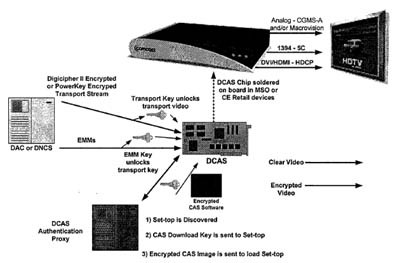
The National Cable & Telecommunications Association (NCTA) has reported to the FCC that it is feasible and preferable to move security away from CableCARD and to the Downloadable Conditional Access System (DCAS). Instead of using a CableCARD hardware key for authentication and decryption, a common security chip is embedded within set-top boxes or televisions will receive and apply a software security key downloaded from your cable providers. Basically, they’ve developed a framework to allow the download of digital certificates. Several manufacturers including Motorola and Scientific-Atlanta have collaborated in the design and testing of the hardware and common language of DCAS. The NCTA expects this technology to begin appearing in consumer devices the summer of 2008.
The good news is that these security features are separate and distinct from the ongoing development of multistream and bidirectional functions currently associated with CableCARDs. We can expect to see that same technology in DCAS devices. Ultimately, implementing DCAS would be simpler for consumers and providers to manage (any set-top box should work with any cable provider without needing to acquire a unique CableCARD). However the limited lifespan of CableCARD technology is an expense manufacturing will ultimately pass along to consumers. Not to mention that CableCARD TiVo box or HDTV you buy in 2006 could be superseded in 2008.
Swell. 10 years after the 1996 telecom law, Cable companies grudgingly finalize cablecard 1.0. But wait. During that time, they thought of a better way to do security. Naturally, this new architecture involves some cutting edge technology, but take the cableco’s word for it- they will be fully ready for switchover in 2008.
At any given point in the future, there will always be a better security scheme.
This is a thinly veled attempt to disrupt cablecard rollout, and enabling the market for non cable company controlled devices.
It’s slimey, but it is par for the course from the cable company divisions dedicated to lobbying and footdragging.
=JT=
It wouldn’t eliminate CableCARD though, there would be an installed base by then (and I’m sure it will be late) and any switchover will take time.
I wonder if it would be possible to get a generic ‘CableCARD’ that had the new chip in it, to convert CC systems to DCAS when the time is right…
It’s pointless. These guys are re-arranging deck chairs on the Titanic. By 2008 people will be swapping TV shows and movies even more frequently with their friends over the internet with bittorrent like tools.
Kids will hack their wi-max enabled iPods to beam shows to eachother and whole pirate wireless IP video networks will spring up in cities with municipally owned wireles.
Central control and distribution of media is a dying industry and no matter how the big monopolies (including the cable monopolies) squirm and wiggle, there’s no escape from the future. Every time somebody pulls a brain dead move like SONY’s root kit, designed to hurt or cripple their customers computers, they will just futher encourage resentment on the part of the public.
Law enforcement will refuse to enforce bad laws bought and paid for by MPAA and RIAA, like DMCA, etc. Politicians will soon swing the opposite way as an increasingly transparent media reports on how they have been selling out the public to greedy hollywood corporate slimebags.
If you are sick of Cable laggards, vote with your dollars. Cancel your high cost HD service and buy or steal basic cable. Buy your TV from Apple’s iTunes store or swap it with your friends. Upgrade your DSL and start bit torrenting or Netflix-ing the movies what you want. Rip those and share them with your friends.
And if Steve Jobs tells you to “NOT STEAL” tell him it’s “Better to be a Pirate than to Join the Army” ( http://tinyurl.com/aanph )